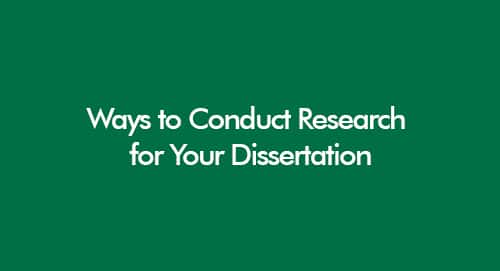
What is Gibbs’ Reflective Cycle and How Can It Benefit You? | Applications and Example
August 15, 2024
Ethics Form for Dissertation | A Guide with Examples
August 28, 2024Conducting Interviews for Your Dissertation is basically talking to people to gain much detailed information and insights that help answer your research questions. Indeed, interviews are among the most powerful qualitative means of gathering data for a dissertation. This technique will also allow an in-depth inquiry into the thoughts, experiences, and opinions of the participants, which would lead to findings giving significant importance to the depth and quality of one's research. However, an interview for the dissertation requires careful planning, preparation, and execution.
Review Qualitative Dissertation Example
This guide will help you through all the stages of conducting successful dissertation interviews: preparation and planning, carrying out the interview, and data analysis.
Understanding the Role of Interviews in Your Dissertation
Interviews are frequently utilised in qualitative research to examine complex issues, gather extensive information, and attain a deep comprehension of the subject matter. The format of these interviews may be categorized as structured, semi-structured, or unstructured, contingent upon the objectives of the research.
- Structured Interviews: These follow a strict protocol comprising pre-established questions, ensuring uniformity throughout the interview process.
- Semi-Structured Interviews: These have a set of guiding questions but allow for flexibility and follow-up questions based on the interviewee’s responses.
- Unstructured Interviews: These are characterised by their conversational format with no pre-set questions that allow the interviewee to lead the conversation.
Interviews are particularly effective in the in-depth examination of personal experiences, perceptions, or opinions, thus becoming a necessary source for dissertations in fields such as social sciences, education, health care, business, and more.
Planning Your Interviews
Effective interviewing requires effective planning. First, define what are the goals of the interviews and how will they contribute to your overall research objectives.
- Identify Your Research Questions: Clearly define the research questions that will be explored through your interviews. This clarity will inform the formulation of your interview questions and ensure their alignment with your research objectives.
- Identify Your Participants: Identify whom you would like to interview. Consider what characteristics your participants should have, such as background, experience, or expertise, and how those might help you get the information you need for your research.
- Determine the Interview Format: Select from in-person, telephone, or online interviews, based on what is most feasible and suitable for your research objectives. Evaluate the benefits and drawbacks associated with each format regarding convenience, expenses, and the depth of data obtained.
- Planning an Interview Guide: Drawing up a list of questions or themes to be covered during an interview. Even if you are doing semi-structured or unstructured interviews, having some kind of guide will ensure the conversations are focused and you cover all the necessary areas.
Preparing for the Interviews
Upon the completion of your planning, the next step involves preparing for the interviews.
- Pilot Testing: Carry out a trial interview with either a colleague or friend where you test your questions and identify potential problems. This will help you refine your questions and approach before going out to conduct the actual interviews.
- Informed Consent: A consent form should be developed that contains information on the purpose of the interview, how the data collected will be used, and what rights a participant has. Any of the participants have to sign this form before they are interviewed.
- Recording Equipment: Ensure that you have the necessary materials for audio-recording the interviews, such as a portable audio recorder or a mobile phone with a good audio recording application. Try out the devices before the interview as a way of avoiding technology challenges in the course of the interview.
- Scheduling: Choose an appropriate time and place that the participant wishes to have so as to maintain confidentiality and reduce risks of interference. It is indicated that the participant needs to receive a confirmation in writing whether it is by email or SMS from one day to two days before the interview.
Conducting the Interviews
The methodology used during the interview can significantly affect the quality of the data analysis and findings. Following are some key processes to be followed;
- Establishing Rapport: Begin by ensuring that the participant feels comfortable. A brief introduction, engaging in casual conversation, and clarifying the objectives of the interview may alleviate any confusion and foster trust.
- Follow Your Guide: Allow your interview guide to lead the interaction; simultaneously, be flexible. If one of your participants brings up something that sounds interesting and relevant to your research, don’t hesitate to explore it further, even if it wasn’t on your list of questions.
- Active Listening: Pay close attention to the participant’s responses. Show interest through nodding, maintaining eye contact (if in person or video), and asking follow-up questions. This not only encourages the participant to share more but also helps you gather richer data.
- Clarify and Probe: In the event that something is not clear, one can ask the participant to elaborate or clarify their point. Probing questions can also be applicable for encouraging the participant to discuss a topic in depth.
- Manage Time: Keep an eye on the time to ensure the interview stays within the agreed duration. If the conversation is going long, politely guide the participant back to the main topics to cover all necessary areas.
- Summarise Elegantly: As the interview nears its conclusion, inform the participant that you are about to finish. Inquire whether they possess any concluding reflections or additional points they wish to convey. Express your gratitude genuinely for their contributions and the time they devoted to the discussion.
Analysing the Data
Following the interviews is the analysis of the data collected, which includes activities like transcription, coding, and interpretation of data collected during interviews.
- Transcription: So let us first undertake the transcribing of the interviews. This might take some time however this is a very vital step as this will enable you to avoid missing even the minute details. Transcribing can be done in two ways, by reasons of handwriting or through transcription software, but the transcripts must always be carefully checked against the contents for any omissions.
- Data Coding: After transcription, continue reading or listening to the recordings so as to engage in coding. This dimension of the methodological process makes it possible for the data to be structured and therefore comes up with particulars to be discussed in great depth and breadth.
- Thematic analysis: Combine codes that relate to each other and give rise to the main factors. They are what will be used in your analysis and will help address the objectives of your study.
- Interpretation: Translate the themes in relation to the research question. Look at how the data interview supports or even contests your assumptions and what new ideas emerged.
- Integrating with Your Dissertation: Lastly, bring in all that you have discovered in your research into your dissertation. These direct quotations can also reinforce some important aspects of your analysis. Be sure to address the contribution of your findings to the literature.
Ethical Considerations
Ethical considerations are paramount when conducting interviews for a dissertation. Always prioritise the well-being and privacy of your participants.
- Privacy: The participant's privacy has to be maintained and guaranteed. When presenting the findings that the authors have done, pseudonyms or codes should be used.
- Ethical Concerns: Informed consent should also apply as earlier mentioned in the case of respondents whereby, them is provided with adequate information regarding the factors to be considered. This provides a chance for the respondents to give informed consent.
Bias and Objectivity: Be sensitive to the biases in your questioning and analysis. Try not to lead the questions in a manner that may influence the participant's responses.
Conclusion
Conducting interviews for your dissertation can be quite rewarding as it is one area that often involves Learning about something in a new dimension. Doing careful planning, preparation, interviewing, and analyzing, then the quality of your dissertation will be enhanced. Always remember to carry out the interviews with professionalism, respect for your participants, and a commitment to ethical research practices. With these principles in mind, you’ll be well-equipped to conduct successful interviews and produce a dissertation that makes a meaningful contribution to your field.
This is the title
Get 3+ Free Fashion Dissertation Topics within 24 hours?



























